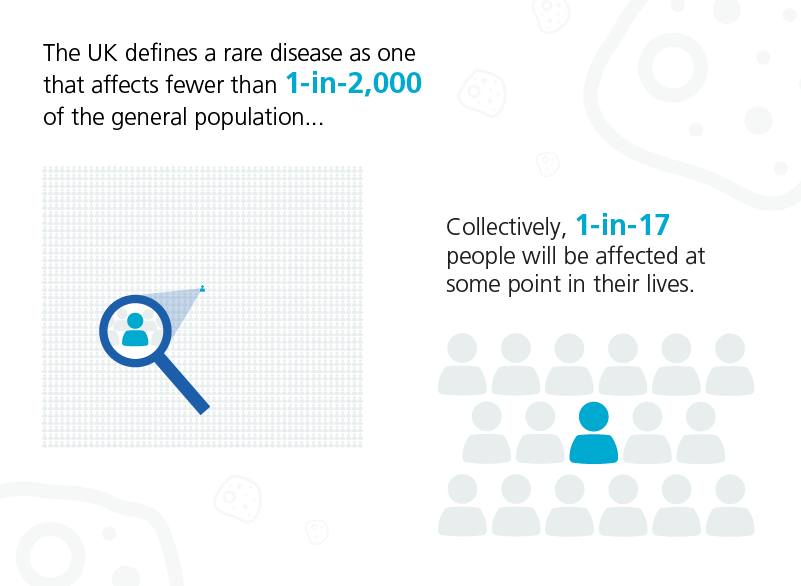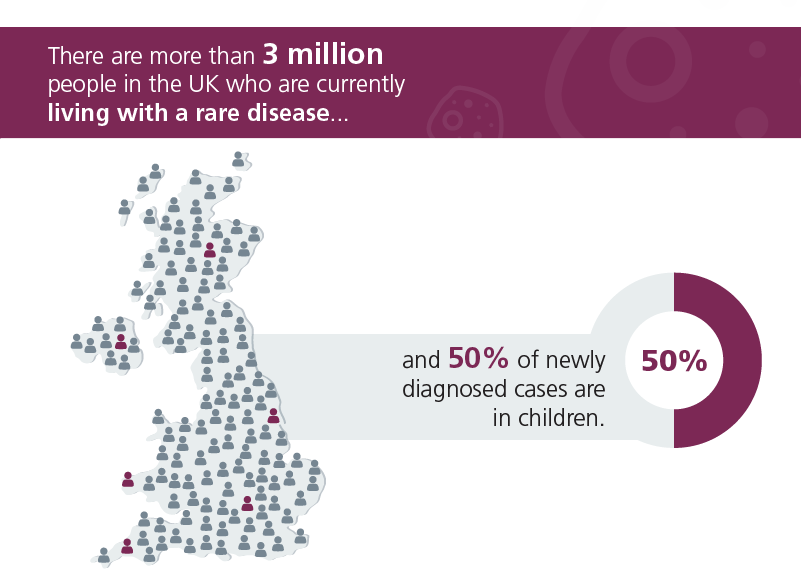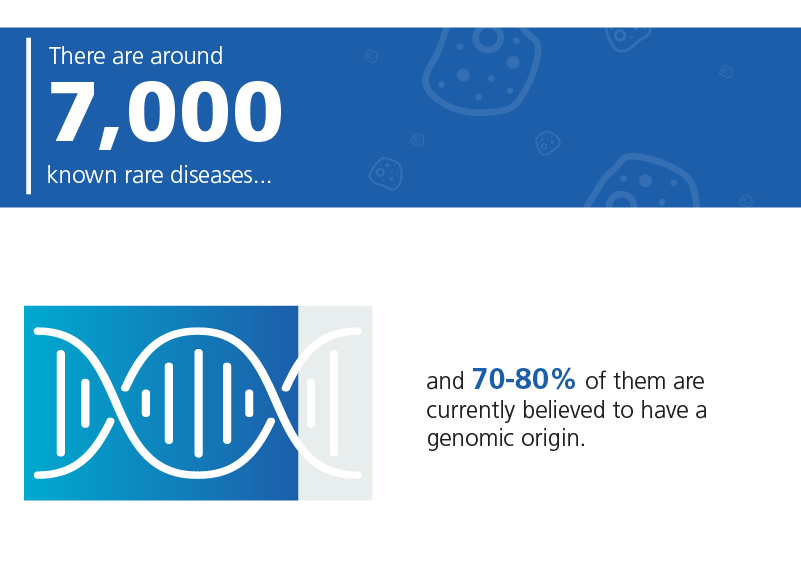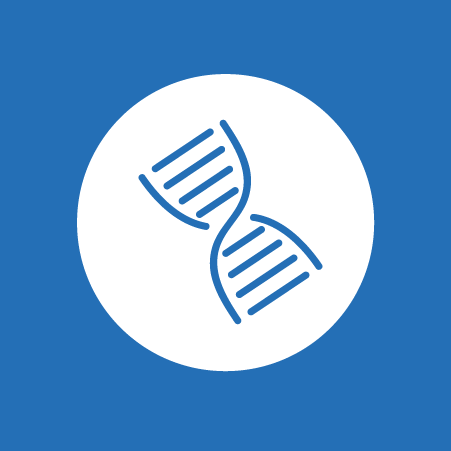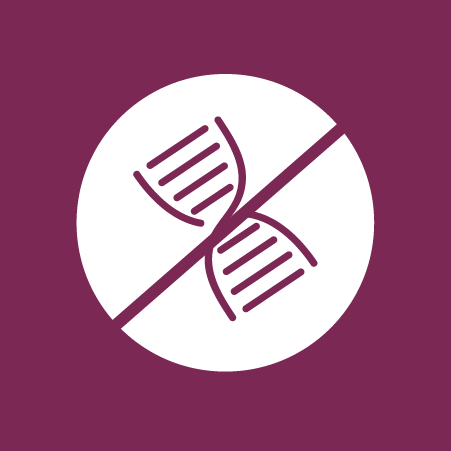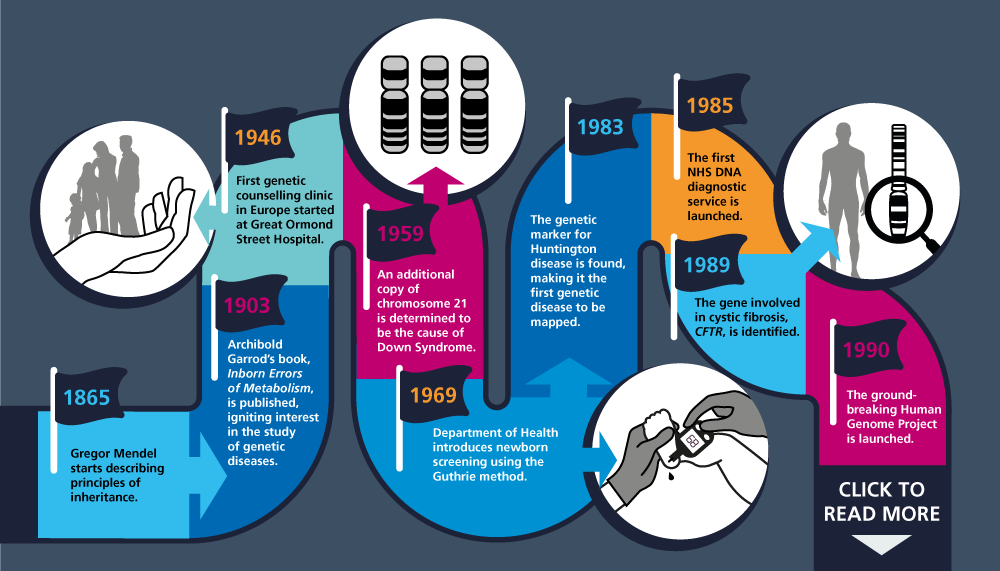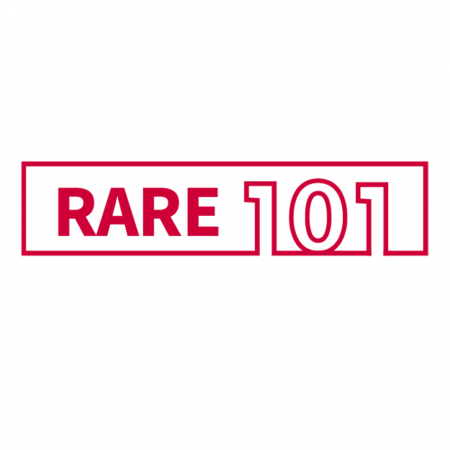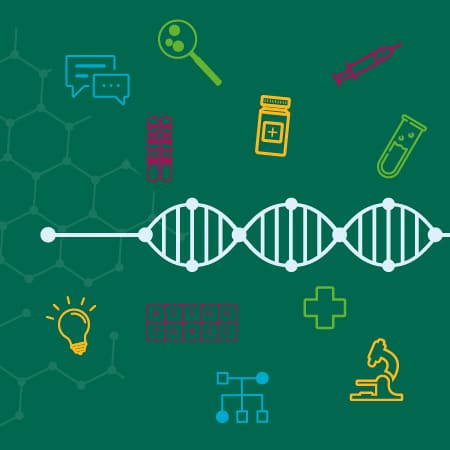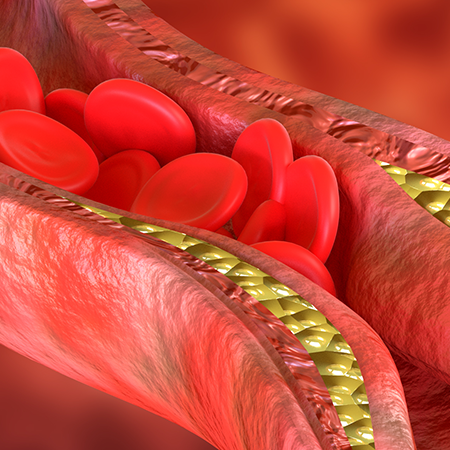Different types of rare disease
Around 80% of rare conditions arise due to changes (variants) in a person’s genomic makeup. These changes can be inherited or may arise for the first time in an individual. Genomic rare conditions like these may arise due to changes in a single gene, or due to changes to a person’s chromosomes. You can find out more about chromosomal conditions on GeNotes. Thanks to a focus in research, we’re learning more about genomic rare diseases all the time.
Multifactorial conditions are caused by a combination of genomic and environmental factors.
Non-genomic conditions, such as myasthenia gravis (MG), do not have a defined genomic cause. Read about Zainab’s experience of being diagnosed with MG here.
Chromosomal
Changes to structure/number: loss or gain of whole chromosomes (monosomy, trisomy) or sections (deletions, duplications); inversions; translocations. For example, cri-du-chat.
Multifactorial
Caused by a combination of genomics and environmental factors – including anything from diet and lifestyle to pollution or other illness – for example spina bifida.
Non-genomic
Those conditions that do not have a defined genomic cause – currently believed to be around 20-30% of rare diseases – such as myasthenia gravis.
Genomic testing
Click on the videos to watch stories from patients and families with confirmed or suspected genomic rare conditions.
The impact of living with a rare condition
Whether their condition is genomic or not, people living with rare disease often report facing similar challenges; challenges that result from the rarity of their condition rather than the pathophysiology itself.
What can healthcare professionals do?
Listen, believe and involve
People with rare conditions often have to fight to be heard, especially on the long road to diagnosis. Although you may not know which rare condition a person has, or much about their diagnosis if they have one, be sure to listen to their experiences and ensure they are well involved in their care planning.
Deliver a ‘good diagnosis’
Think carefully about how and when you deliver a rare disease diagnosis. Deliver the diagnosis face-to-face where possible, allowing time for questions and discussion. Provide written information on the condition, signpost to an appropriate patient advocacy group and ensure that your patient is clear on the next steps in their care plan and who is leading their care.
You can read more about how to deliver a good diagnosis in this report from Genetic Alliance UK.
Remember those without a diagnosis
Those with a suspected, but unconfirmed, rare disease need support, too. Around 6,000 children are born each year in the UK with syndromes without a name (known as SWAN) – conditions that are so rare that they remain difficult to diagnose. These children often have complex needs and require lifelong multidisciplinary care. SWAN UK is the only specialist support network in the UK for impacted families and is an important patient advocacy group to be aware of.
Ask your patients how they are coping
85% of people impacted by rare conditions report that their condition negatively impacts their mental health. 75% of people never receive mental health support, though 87% accept it when offered. Remember to ask your patients about how they’re coping, and connect them to appropriate mental health support when this is required. You can read more about mental health and rare disease in our knowledge hub summary and in this report from the charity Rareminds.
Support transitions of care
Moving from paediatric to adult services can be an especially challenging time for people with rare conditions. You can support patients and their families by starting conversations about transition early, ensuring clear communication between teams and tailoring the transition pace to individual needs. You can learn more about this critical transition time on GeNotes.
Familiarise yourself with the fundamentals of rare disease
Nobody can be an expert in every rare condition. Instead, professionals can learn to appreciate the common themes and challenges for people with rare conditions and learn to recognise aspects of a history or presentation that could indicate an underlying rare disease. Rare Disease 101 from Medics for Rare Disease covers the fundamentals of rare disease for healthcare professionals to enable you to better recognise, diagnose and support affected people.
Making progress
Huge advances have been made in the field of rare disease – particularly when it comes to genomics – over time. Click on the image to learn more. (Please contact us if you require a transcript.)
It’s interesting to see just how many of these advances have been made since the turn of this century. The hope is that the speed of our advances will continue to increase – and genomic technology plays a part in that.
It’s clear, however, that much more needs to be done for people with both genomic and non-genomic rare conditions.
The national Genomic Medicine Service intends to bring the benefit of advances in genomics to the wider public, including those living with rare conditions, whilst the UK Rare Diseases Framework outlines four priority areas for work to improve the lives of this group of people.
Each UK nation publishes an annual Rare Disease Action plan which demonstrates the work that is being undertaken in each of these areas. You can read England’s 2024 action plan here.
UK Rare Diseases Framework priority areas
- Helping patients get a final diagnosis faster
- Increasing awareness of rare diseases among healthcare professionals
- Better co-ordination of care
- Improving access to specialist care, treatment and drugs
The UK Rare Diseases Framework identified that there is a great and urgent need for education in rare disease generally, and also in genomics. This is explored in our short film, produced in collaboration with ITN Productions Industry News, as part of a programme with Genetic Alliance UK.
As an educational programme tasked with delivering genomics education, training and experience for the healthcare workforce, the Genomics Education Programme has a role in tackling priorities one and two of the framework.
As always, the programme welcomes contribution and collaboration. If you have any suggestions for this resource, you can contact us.
Find resources
I am looking for information on a particular condition
Eurordis is a non-profit alliance of more than 1,000 rare disease patient organisations from 74 countries. Click here to search through their member patient organisations.
Gene People is a genetic conditions support network. Search its list of patient groups and charities for rare conditions.
Genetic Alliance UK is the largest alliance of organisations supporting people with genetic, rare and undiagnosed conditions in the UK. Their member directory links directly to lots of individual patient group websites.
NORD (National Organization for Rare Disorders) advances practical, meaningful and enduring change so people with rare diseases can live their fullest and best lives. Search their rare disease database here for more information on a specific condition.
Orphanet Directory of Rare Diseases is a comprehensive online resource on rare diseases. You can search for a rare disease by name, ORPHAcode, gene symbol/name, MIM number or ICD-10 to find more information on the epidemiology, etiology, diagnostic information, genetic counselling, management and treatment. Orphanet also offers a global directory of patient advocacy groups.
Unique is a long-established and well-respected UK charity for rare chromosome and other genetic disorders. The website hosts practical guides on specific chromosome and gene disorders.
I am looking for support for my patient with a suspected genomic condition who has no diagnosis
Genetic Alliance UK is the largest alliance of organisations supporting people with genetic, rare and undiagnosed conditions in the UK. They run SWAN UK (Syndromes Without a Name), the only support network for children, young people and their families affected by a genetic condition so rare that it does not yet have a name. You can register for SWAN UK membership here.
I am looking for support for family members of someone with a rare condition
CamRare is based in Cambridge but works all over the UK. It has a great community group, Unique Feet, for families of children and young people with different conditions to connect.
Gene People is a genetic conditions support network. Click here to learn how to manage news of a newly-diagnosed rare condition within the family.
Same but Different creates thought-provoking campaigns that stimulate conversation, change attitudes and empower those affected. It has a web page with advice about how to manage relationship difficulties when living with a rare condition.
Unique is a long-established and well-respected charity for rare chromosome and other genetic disorders. They have a guide for supporting siblings of children with a rare genetic condition.
I am looking for opportunities for my patient to take part in research
ClinicalTrials.gov has a global search function to look for research trials for a specific condition.
The National Institute for Health and Care Research (NIHR) fund enables and delivers health and social care research to improve people’s health and wellbeing. Learn more about how to take part in NIHR research and use the search bar to find research opportunities by location or keyword.
NORD (National Organization for Rare Disorders) advances practical, meaningful, and enduring change so people with rare diseases can live their fullest and best lives. Click here to explore the research section of the NORD website.
Orphanet is a comprehensive online resource on rare diseases that exists to improve diagnosis, care and treatment for patients. You can search for research and trials for a specific condition on the website.
I am looking for advice on mental health support for someone affected by rare disease
Beacon for Rare Disease is a UK-based charity that is building a united rare disease community with patient groups at its heart. Find plenty of mental health resources in this dropbox folder
Breaking Down Barriers champions efforts to provide more inclusive support. Here is a resource to support someone with loss and grief.
GeNotes is a resource for clinicians who are supporting patients through genomic testing. The GeNotes Knowledge Hub has hundreds of useful resources, including this piece on mental health and rare disease.
Medics for Rare Disease (M4RD) is a charity with an online learning platform offering several free online courses. Click here to enrol in M4RD’s mental health and rare disease module
Rareminds is the first specialist, non-profit, rare disease counselling and psychotherapy service in the UK. Find lots of wellbeing resources specifically for those living with rare conditions on their site.
Unique is a long-established and well-respected charity for rare chromosome and other genetic disorders. Here is their guide for mental health and wellbeing when living with a rare condition.
I am looking to support a patient in their transition from paediatric to adult care
Cambridge Rare Disease Network unites patients, advocates and leaders to address the challenges faced by people affected by rare diseases. Click on this link for a flipbook of information and advice about transitioning from child to adult care.
GeNotes: Read our Knowledge Hub article about supporting patients in their transition to adult services.
Unique is a long-established and well-respected charity for rare chromosome and other genetic disorders. Here is their guide for transitioning from child to adult care when living with a rare condition.
I am looking for support with education for young people with rare conditions
Breaking Down Barriers champions efforts to provide more inclusive support. There is a selection of resources about the subject of education here:
CamRare (Cambridge Rare Disease Network) builds cross-sector networks to improve outcomes for people with rare diseases. Here is its guide for educating a child with a rare disease.
Gene People is a genetic conditions support network, which has a great webpage that covers all elements around education for a young person with a rare condition.
Unique is a long-established and well-respected charity for rare chromosome and other genetic disorders. Click here for their guide about navigating education with a rare condition.
I am looking for financial support for families affected by rare disease
CamRare (Cambridge Rare Disease Network) builds cross-sector networks to improve outcomes for people with rare diseases. Click here for more information about getting financial support when living with a rare condition.
Gene People is a genetic conditions support network. This webpage gives more information about how to receive benefits, grants, and social care.
Same but Different creates thought-provoking campaigns that stimulate conversation, change attitudes and empower those affected. Here is a guide about how to get benefits when living with a rare condition.
Further learning
Learn practical tips to better care for anyone with a rare condition with Medics for Rare Disease’s digestible online course.
30+ minutes
Learn how genetic conditions are inherited, and how to recognise the common modes of inheritance in a family history, in this short online course.
30 minutes
Learn about key information to consider when offering a genomic test to patients and their family members in this short, flexible online course.
30 minutes
An introductory e-learning module for anyone who is working in primary care, including in nursing and pharmacy.
60 minutes


